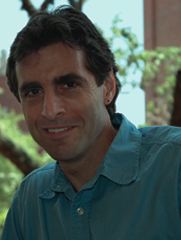William Marsiglio, Ph.D.
Professor of Sociology
College of Liberal Arts and Sciences
2005 Awardee
 William Marsiglio studies men’s sexuality, reproduction, fathering and paid/volunteer work with youth outside the home.
William Marsiglio studies men’s sexuality, reproduction, fathering and paid/volunteer work with youth outside the home. He has published six books including two based on primary data collected for separate studies: Sex, Men, and Babies: Stories of Awareness and Responsibility, and Stepdads: Stories of Love, Hope, and Repair. He is also the lead editor of Situated Fathering, a volume exploring how physical and social spaces affect men’s fathering.
“I became interested in this field because there was little research on how men experience issues related to their ability to procreate and care for children-their biological children as well as others,” Marsiglio says. “Once I started to do research in this area, one thing led to another, and I am finding new avenues within the same general area.”
Stepdads consists of 51 in-depth interviews and is the only qualitative study of its kind. The book examines in detail how stepfathers try to make sense of their feelings and circumstances while managing the challenges of their unconventional, complicated lives. Marsiglio wanted to find out how men develop their identities and manage their experiences as stepfathers. Through this study, he is developing a workshop for stepfathers and birth mothers to enhance their adjustment to stepfamily life.
Sex, Men, and Babies was based on 70 interviews of single men between the ages of 16 and 30. This study examined how young men become aware of their ability to procreate, then experience their romantic relationships and fertility events. Marsiglio is designing interventions to encourage young men to be more aware of their abilities and responsibilities in making babies.
Currently, Marsiglio is interviewing men for a book examining men’s perceptions of and interactions with youth in diverse settings (e.g., coaches, teachers, youth pastors, Big Brothers). His research is finding that men’s experiences outside the home help them deal more positively with their own children, and vice versa. He also is preparing a more focused grant proposal to study men’s orientation toward and experiences with mentoring youth in the Big Brothers/Big Sisters program.
“The relevance of his work extends well beyond the academic discipline of sociology,” says John Henretta, professor and chair of the sociology department. “Simply put, his research is at the forefront of his specialized field.”

